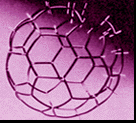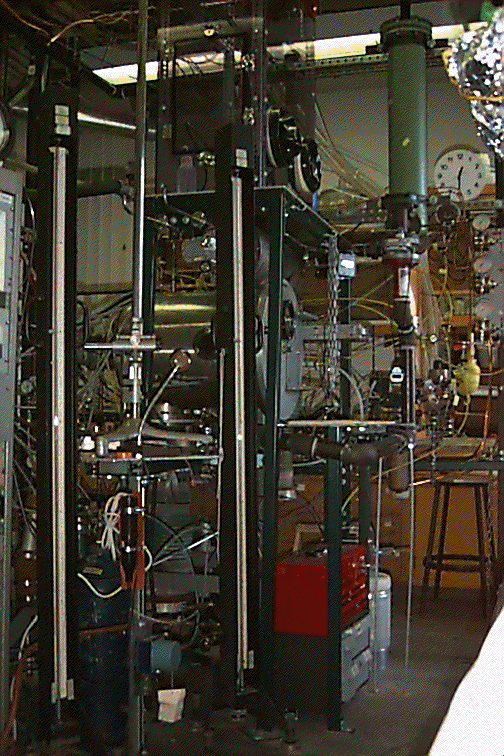Combustion Research
Massachusetts
Institute of Technology
Department of Chemical
Engineering
under the supervision of
Professor
Jack B. Howard
Kinetics Models and Data Used in
Calculations
Marr PAH
Model Used in Conjunction with Experimental Soot Data
Super
critical water oxidation model of Dinaro
Kinetic Modeling of Premixed Flames
Modeling of acetylene, ethylene and benzene combustion in laminar premixed
low-pressure flames (Formation and Consumption of Single-Ring Aromatic
Hydrocarbons and Their Precursors in Premixed Acetylene, Ethylene and
Benzene Flame by Henning Richter and Jack B. Howard, published in
Physical Chemistry Chemical Physics, see below): The mechanism has been
applied successfully to rich acetylene, ethylene and benzene flames, a
lean ethylene flame and a stoichiometric methane flame. The formation of
polycyclic aromatic hydrocarbons (PAH) containing up to three condensed
rings is included. Details fo PAH formation and depletion will be
described in a future publication. The reaction mechanism and sets of
thermodynamic property and transport data can be downloaded below.
Comments (including critical ones!) are very welcome and should be
addressed to Henning Richter (richter@mit.edu).
Reaction mechanism in
Chemkin format
Thermodynamic
properties in Chemkin format
Transport data
in Chemkin format
Detailed Modeling of Soot Formation
A detailed kinetic model describing the formation of soot particles
with diameters of up to .70 nm has been developed. The previously
published kinetic network, tested for premixed benzene, acetylene and
ethylene flames (Phys. Chem. Chem. Phys., 2002, 4, 2038-2055. see
below), has been extended. The reaction mechanism is provided below for
low-pressure and atmospheric pressure conditions taking into account
pressure dependence of chemically activated reactions. (Acknowledgement
and Disclaimer: This material is based upon work supported by the National
Science Foundation under Grant No. 0123345. Any opinions, findings,
conclusions, and recommendations expressed in this material are those of
the authors and do not necessarily reflect the views of the National
Science Foundation.)
This soot model is considered to be not published at the current stage and
has been used for the following papers submitted to the 30th International Symposium on
Combustion
a) The model is discussed in detail in: "Detailed Modeling
of PAH and Soot Formation in a Laminar Premixed Benzene/Oxygen/Argon
Low-Pressure flame" by Henning Richter, Silvia Granata, William H. Green
and Jack B. Howard (low-pressure version of the model).
b) The predictive capability of the atmospheric pressure version
of the model has been tested and used for reaction pathway analysis
in: "PAH Formation in a Premixed Fuel-Rich Atmospheric Pressure Flat
Ethylbenzene Flame" by Ali Ergut, Silvia Granata, Jude Jordan, Joel
Carlson, Jack B. Howard, Henning Richter and Yiannis A. Levendis.
The manuscripts refer to the present webpage and this link is intended to
assist the review process. Mechanisms, thermodynamic and transport data
are given in Chemkin format.
Atmospheric
pressure soot model
Low
pressure soot model
Thermodynamic
data
Transport
data
Physcial Chemistry Chemical Physics paper
Formation and
conusmption of single-ring aromatic hydrocarbons and their precursors in
premixed acetylene, ethylene and benzene flames
by Henning Richter and Jack Howard
Electronic
Supplementary Information - Table II
Electronic
Supplementary Information - Table III
Reaction
mechanism
Thermodynamic
property data
Transport data
Combustion and Flame paper
Investigation
of stoichiometric methane/air/benzene (1.5%) and methane/air low
pressuer flames
by Laurent Dupont, Abderrahman El Bakali, Jean-Francois Pauwels,
Isabelle Da Costa, Philippe Meunier, and Henning Richter
Papers published at the Twenty-Eighth International
Symposium on Combustion
Analysis of an
Elementary Reaction Mechanism for Benzene Oxidation in Supercritical
Water
by Joanna Dinaro, Jack Howard, William Green, Jefferson
Tester, and Joseph Bozelli
Synthesis of
Fullerenes and Fullerenic Nanostructures in a Low Pressure Benzene/Oxygen
Diffusion Flame
by Peter Hebgen, Anish Goel, Jack Howard, Lenore Rainey, and
John Vander Sande
Analysis of Soot
Surface Growth Pathways using Published Plug-Flow Reactor Data with New
Particle Size Distribution Measurements and Published Premixed Flame
Data
by David Kronholm and Jack Howard
Formation of
Polycyclic Aromatic Hydrocarbons and their Radicals in a Nearly Sooting
Premixed Benzene Flame
by Henning Richter, Timothy Benish, Oleg Mazyar,
William Green and Jack Howard
Extended Abstract for Third
International Conference on Carbon Black
Combustion
Synthesis of Fullerenes and Fullerenic Nanostructures
by Peter Hebgen, Anish Goel, Lenore Rainey, John Vander Sande,
and Jack Howard
Papers published in Carbon
Combustion
Synthesis of Fullerenes and Fullerenic Nanostructures (2002)
by Anish Goel, Peter Hebgen, John Vander Sande, and Jack
Howard
Reaction
rate coefficient of fullerene (C60) consumption
by soot (2003)
by Anish Goel and Jack Howard
Size
Analysis of Single Fullerene Molecules by Electron Microscopy (2004)
by Anish Goel, Jack Howard, and John Vander Sande

 Fullerenes (left), Radical Scavenging (right)
Fullerenes (left), Radical Scavenging (right)
Researchers
Dr. Henning Richter (richter@mit.edu)
Recent Group Members
Quico Ayala (quico@gmx.net)
Dr. Timothy Benish
Gerardo Ferreiro (gerardunish@hotmail.com)
Dr. Anish Goel (anish@mit.edu)
Dr. William J. Grieco (william_j_grieco@rohmhaas.com)
Isidro Griful (griful@airtel.net)
Dr. Peter Hebgen (hebgenpg@corning.com)
Dr. Murray Height (mjheight@alum.mit.edu)
Dr. David F. Kronholm (dkronholm@nano-c.com)
Stephen Lasher (lasher.stephen@adlittle.com)
Thilo Lehre (thilolehre@gmx.de)
Dr. Carsten Steffin (carsten.steffin.cs@hcstarck.de)
Dr. Ning Xie
Organizations of Interest
Center for Environmental
Health Sciences (CEHS)
The Combustion
Institute
Combustion and
Flame
National Energy Research Scientific
Computing Center (NERSC)
National Institute of Standards
and Technology
Reaction Design
Sandia National Laboratory
This site maintained by anish.



